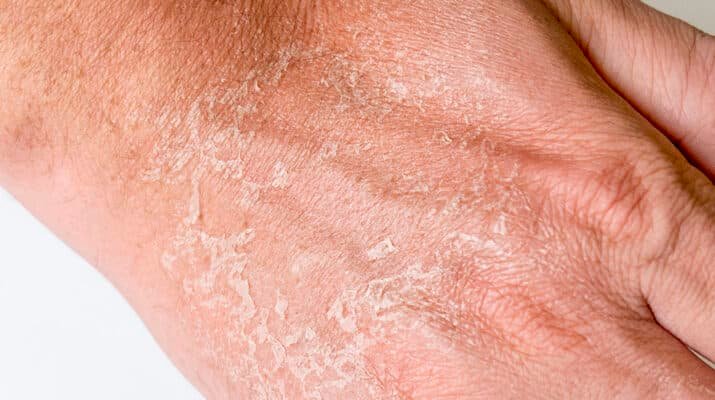Older skin is especially prone to drying out during winter months
By Deborah Jeanne Sergeant

If you or someone you love is “of a certain age,” they may experience ongoing dry skin during the winter.
“Most people around 60-plus are going to experience some dry skin, which could be secondary to other issues like post-menopausal, thyroid issues or other diseases,” said Joyce Farah, dermatologist at Farah Dermatology in Syracuse.
She added that in winter, factors such as low humidity and dry air indoors worsen the effect of run-of-the-mill dry skin. Cleaning with abrasive soap and cleaners can also irritate the skin.
It is important to address dry skin.
“Once the barrier function is compromised, you can have secondary complications like infections,” said Ramsay Farah, a dermatologist at Farah Dermatology and brother of Joyce Farah. “It can be a point of entry for infection or there can be contact dermatitis.”
Ramsay Farah recommended trying a humidifier, as well as staying well hydrated. Skip alcohol and caffeine, as these can contribute to dryer skin.
How the skin is treated also matters. Deodorant soap, abrasive formulations or heavily scented soap are common culprits behind dry skin. Instead, clean with emollient-based products and lukewarm water.
“Really hot water promotes further evaporation loss from the skin, even though it feels nice,” Ramsey Farah said. “It makes dry skin worse.”
Take shorter showers and afterwards, pat skin dry — don’t rub. Apply moisturizer after the shower to help lock in moisture. Ask for help or use a long-handled scrubber to apply in hard-to-reach areas. Protect skin from exposure to cleaning chemicals and dishwater with latex gloves and wear gloves when outside.

“When we’re older, we’re more likely to lose water through our skin because of thinning,” said Christopher J. Norman, registered nurse and associate medical director at PACE — Program of All-Inclusive Care for the Elderly of Central New York in East Syracuse. Norman is certified as a geriatric nurse practitioner, advanced practice holistic nurse and in other geriatric care specialties.
He encourages older adults to build moisturizing into the routine to help keep skin soft. For example, placing a container of hand cream near the sink can serve as a handy reminder to apply it after handwashing. It’s also helpful to carry along a moisturizer to apply when out all day.
Avoid using moisturizers on the feet unless wearing footwear. Norman also cautioned against using bath oil, as it can contribute to a higher fall risk.
“Use something unscented as a base layer,” Norman said. “Some older adults can have different sensitivities which can cause itching and dryness.”
The type of moisturizer can make a difference. In general, thin, runny lotion doesn’t help much. Their water base means the product evaporates quickly.
“Vaseline is one of the best moisturizers but most people don’t like it as it’s thick,” said gerontologist Sharon Brangman, faculty member at SUNY Upstate Medical University and a distinguished service professor, chairwoman of geriatric medicine and director of the Upstate Center of Excellence for Alzheimer’s Disease. “If you’re not going anywhere for a while, use Vaseline. Some people put it on overnight before going to bed.”
Especially after bathing, “put on a moisturizer,” Brangman said. “Slather it on. And use it during the day as well after washing your hands or washing dishes. You may need help with parts of your body that you can’t reach. The heels of the feet can get dried and cracked. Or the back. That’s often neglected.”

Ibrahim Tangoren, dermatologist and owner of I. A. Tangoren MD Dermatology in Syracuse, called Vaseline the “gold standard for reducing water loss through the skin.”
It’s not always practical to use Vaseline, so Tangoren said that creams and ointments are recommended as they last longer.
“Look for fragrance-free, hypoallergenic formulations with ingredients that hydrate, seal and repair the skin barrier — like ceramides, glycerin and petrolatum,” he said. “Ceramides rebuild and strengthen the skin barrier. Glycerin draws moisture into the skin. Hyaluronic acid attracts and holds water for hydrated, plump skin. Petrolatum and dimethicone seal in moisture and protect against water loss.”
For people who want to exfoliate rough skin, Tangoren recommends formulas of urea (≤10%) or lactic acid (≤5%). Other helpful ingredients include colloidal oatmeal to soothes itching and irritation and shea butter or mineral oil to “provide rich emollient moisture and smooth texture. Niacinamide supports barrier repair and reduces redness or irritation.”
When over-the-counter moisturizers are not enough to make a difference, prescriptions may help.
Tangoren said that these include topical corticosteroids (hydrocortisone, triamcinolone, betamethasone) to reduce inflammation and itching; topical calcineurin inhibitors (tacrolimus, pimecrolimus) as steroid-free options for long-term maintenance; topical phosphodiesterase-4 inhibitors (crisaborole) to control mild eczema without steroids; keratolytic creams (urea 20–40%, lactic acid 12%) to soften and remove thickened skin; barrier repair creams (prescription ceramide-dominant formulas) to rebuild the skin’s lipid layer; antihistamines (cetirizine, hydroxyzine) to relieve nighttime itching; and systemic agents (dupilumab, others) used only under specialist care for severe eczema or chronic inflammation.
Tangoren also encourages people with severely dry skin to discuss their other medications which may worsen dry skin.
“Dry skin may happen to all of us but dryness and itching can have other causes like thyroid and kidney disease,” he added. “Diabetics, if their sugar is out of control and those with iron deficiency and certain kinds of cancer can be dry and itchy. If it gets really bad, go see a care provider.”

